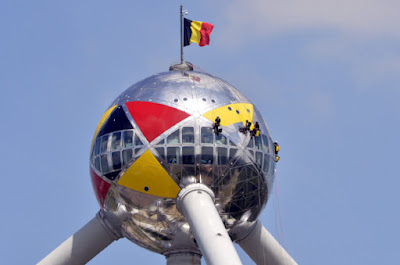I'm My Father's Son
So last week was a public holiday in Belgium to celebrate Belgian National Day, which is a time to remember the events of 1831 where Leopold of Saxe-Coburg, later to become Leopold I and the first Monarch of Belgium, swore allegiance to the new united Belgium's constitution. The Day starts with a service at the Cathedral of St Michael and St Gudula which is attended by the current Monarch, King Philippe, and other invitees, and is then followed by a full day of events which includes a low-level fly over of Brussels by the Belgian Airforce - See the videos below. I saw them practising earlier in the week when they flew over my office, and lets just say that if one of the pilots had blinked I would probably have noticed! Nerves of steel for sure.
The history of the Monarchy in Belgium makes for interesting reading. Including Leopold I in 1831, there have only been 7 Monarch's in the countries history, mainly due to the fact that the Kingdom of Belgium did not exist before 1830. Taking a very quick tour through it's history, Belgium was originally part of a region that came to be know as the Low Countries, a mixture of modern day Netherlands, Belgium, Luxembourg and parts of Germany. The ownership of the Low Countries changed hands multiple times between feuding groups until the 8th Century when the Pope appointed Charlemagne as Emperor of the Roman Empire, which included the Low Countries at that period of time. Over the next 600 years the Kingdom of France and the Roman Empire fought over the area in an attempt to cement their sphere of influence. In the 16th Century the area was ruled by Habsburg Spain, followed by the Spanish Netherlands in the 17th and the Austrians in the 18th Centuries. This then passed back to the now established Kingdom of the Netherlands in the early 19th Century before the Kingdom of Belgium was established in 1830. Ultimately, over the course of 1,000 years today's Belgium was ruled by no less than 13 dynasties.
Some will know that the relatively inconspicuous country of Belgium held a number of African colonies during the 19th and 20th Centuries which included modern-day nations such as Burundi, the Democratic Republic of Congo and Rwanda, as well as smaller territories in China and Guatemala. Most of the African colonies didn't come from wide-reaching military action, but were instead originally part of the personal property of King Leopold II who ruled from 1865 to 1909. Most of this 'property' was the Belgian Congo, now called the Democratic Republic of Congo, which was around 76 times bigger by land area than Belgium itself. The true history of Leopold II has only become clear over the past 20 years or so, but essentially he was a nasty piece of work though not necessarily any different than other Monarchs with dreams of an empire of the time. Over the course of his 44 year reign the general consensus is that his regime oversaw the deaths of around 10 million Congolese people, which is two-thirds of the deaths that occurred during world war I.
Leopold II ran the Belgian Congo through the use of a mercenary force called the Force Publique, which consisted of an entirely Belgian officers corps who were drawn to the Congo due to the wealth and prestige that could be received from it's most profitable export - rubber. At one point Leopold II became concerned that the Force Publique were using too many bullets and so decreed that a shot could only be fired if it killed a Congolese citizen, i.e only fire if it hits and doesn't miss. To ensure this rule was followed, Leopold II added that the hand of the killed Congolese should be severed and sent back to Belgium as proof. This decree did not suddenly make the Force Publique expert shots overnight, and so in fact what happened was many years of mutilation by their soldiers because when they did miss, to account for the bullet they cut off the hand of anyone that could find, regardless of whether that person had been aimed at to begin with. The profit that was made from the Belgian Congo was largely re-invested in a great public and private works program back in Belgium which earnt Leopold II the nickname of ' the Builder King'. To this day, a divide remains in Belgium between those who remember Leopold II as the king who made Belgium what it is today due to stories past down through families over generations, and the wider truth that is still being discovered today on Belgium's impact on the Congolese people. Belgium is full of statues of Leopold II alongside Congolese people, including in Oostende which has a plaque that reads "the gratitude of the Congolese to Leopold II for having liberated them from slavery under the Arabs". The adage that history is always written by the victors continues to be true in this case. Reports of the deaths and abuse led to international condemnation and resulted in Leopold II handing the Congo over to Belgian civil administration in 1908 before they then gained independence in 1960. Modern-day Rwanda gained independence from Belgian rule in 1961.
Modern day Rwanda and the Democratic Republic of Congo have taken both vastly different but also very similar paths. Many will remember or at least be aware of the 1994 Rwandan genocide where the downtrodden Hutu population rose up against the Tutsi rulers that the Belgian had left in control post independence, which ultimately saw the slaughter of between 500,000 and 1,000,000 Rwandans. The Democratic Republic of Congo has also been through periods of unrest due to different political factions fighting for control. The country has changed its name three times in the last 50 years, and since 1996 has been in a permanent state of civil war where an estimated 3,000,000 people have died as a result of the conflict, with many more on top through malnutrition due to a non-functioning government at the helm. Rwanda today is seen as a giant compared to its situation 20 years ago with a GDP per capita of just over US$2k, a five times increase compared to 1997. However, it still has a long way to go considering that Rwanda is ranked 159th in the world on the Human Development Index. Where Rwanda does stand out from its neighbours is the fact that 90% of the population has access to both primary and secondary healthcare through low cost insurance schemes called mutuelles de sante. These schemes involve each member of the population paying an average of US$2 per year to receive preventive and basic curative medical assistance. Despite the highly checkered Belgium-Rwanda past, mutuelles are actually a result of Belgian intervention and Belgian workers, including myself, are all legally required to be a member of a mutuelle at a cost of €120 per year which allows for basic cover. As a result of the mutuelles in Rwanda, between 2005 and 2013 life expectancy increased from 55 years to 64, the rate of still-births halved and cases of tuberculosis decreased from 101 to 69 cases per 100,000 people. These figures of course are well behind Western standards, but ahead of neighbouring countries such as the DRC which has an average life expectancy of 48 years. 48 years... in the DRC I would only have 19 years left to live on average - puts having to wait an extra year or two for a UK state pension into perspective.
One of the reasons for the difference in health performance can be attributed to the lack of valuable natural resources in Rwanda compared to a bountiful choice in the DRC. It may seem odd to say that Rwanda has done better without a range of natural resources, but a theory called the Paradox of Plenty goes some way to explain this. The Paradox, also known as the Resource Curse, describes an issue where countries with a large amount of natural resources tend to have slower economic growth and be less democratically stable than those with fewer resources. Some of the reason for this is a lack of economic expertise to manage the price volatility that trading in natural resources attract. To give an example, Angola is an incredibly oil and diamond rich nation which saw 99.3% of its export revenue come from these two resources along in 2005. Diamond prices tend to be relatively stable, however as we all know oil can fluctuate massively, increasing from US$10 per barrel in 1998 to US$145 per barrel in 2008. Angola prospered during those 10 years, however when oil prices fell by half in early 2009 the country fell into disarray. Imagine trying to plan healthcare, investment and social budgets and policies for a country where your GDP can halve almost overnight. On top of that, countries such as Angola will tend to borrow heavily during periods of economic growth but will then be unable to keep up debt repayments when prices fall.
A solution to this is to simply sell off or lease your natural resources to a third party, which is what Tanzania did with their plentiful natural gas reserves when they leased 74% of their fields to BP in the late 1990's. Tanzania agreed a deal where they received an up-front payment, along with a % of profits each year over the 15 year term of the deal, along with a minimum payment to be received each year to reduce price & supply related risks. Of course, this seems like a good way for Tanzania to plan revenues and associated investments for a 15 year period and in return BP receives preferential tax breaks and export tariffs. What actually happened was more underhand - due to Tanzania's inexperience of this level of deal, BP ensured that the profit they made each year was minimal by using Tanzania's own tax break clause against them to offset costs against profits, as well as using shell corporations to funnel profits out of the country. This resulted in Tanzania only receiving the minimum payment each year rather than the additional share of the profits as well. This calamitous deal led to the eventual collapse of the Tanzanian government amid cries of corruption. Tanzania has since taken back control of its natural gas fields, however they are currently in the process of auctioning off some of them again with it rumoured that BP, Shell and Total are amongst the most likely winners. Whilst all this is going on, Tanzania's population of 51 million continue to suffer with a Human Development Index of 151st despite a GDP that ranks them as 83rd, suggesting that, despite a turnaround in its fortunes, the people of Tanzania are not seeing the fruits of the countries labour.
Looking back over all of this I've covered colonialism, the economy, history and politics. A soup of issues if there ever was one. Who'd want to be a politician? I think I'll just stick to writing about cats and coke cans in the next edition. As Nancy Cartwright once said, "Stick to what you know. Either way, you're damned if you do, and you're damned if you don't".



Comments
Post a Comment